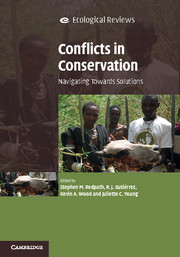Book contents
- Frontmatter
- Dedication
- Contents
- List of contributors
- Foreword by Georgina Mace
- Acknowledgements
- Part I Introduction to conservation and conflict
- PART II Contrasting disciplinary approaches to the study of conflict in conservation
- 3 The value of ecological information in conservation conflict
- 4 Environmental history and conservation conflicts
- 5 The political ecology of conservation conflicts
- 6 Understanding conservation conflicts: an economic perspective
- 7 Anthropological approaches to conservation conflicts
- 8 Law and conservation conflicts
- 9 The relevance of psychology to conservation conflicts
- 10 Conservation conflicts: ethical issues
- 11 A view from sociology: environmental movement mobilisation over old-growth temperate rainforests in British Columbia
- 12 Peace research and conservation conflicts
- 13 Linking conflict and global biodiversity conservation policies
- Part III Approaches to managing conflicts
- Index
- Plate Section
- References
5 - The political ecology of conservation conflicts
from PART II - Contrasting disciplinary approaches to the study of conflict in conservation
Published online by Cambridge University Press: 05 May 2015
- Frontmatter
- Dedication
- Contents
- List of contributors
- Foreword by Georgina Mace
- Acknowledgements
- Part I Introduction to conservation and conflict
- PART II Contrasting disciplinary approaches to the study of conflict in conservation
- 3 The value of ecological information in conservation conflict
- 4 Environmental history and conservation conflicts
- 5 The political ecology of conservation conflicts
- 6 Understanding conservation conflicts: an economic perspective
- 7 Anthropological approaches to conservation conflicts
- 8 Law and conservation conflicts
- 9 The relevance of psychology to conservation conflicts
- 10 Conservation conflicts: ethical issues
- 11 A view from sociology: environmental movement mobilisation over old-growth temperate rainforests in British Columbia
- 12 Peace research and conservation conflicts
- 13 Linking conflict and global biodiversity conservation policies
- Part III Approaches to managing conflicts
- Index
- Plate Section
- References
Summary
When I speak to conservation science audiences about the social dimensions of conservation, I am often asked why, as a social scientist, I am so intent on ‘making conservation political’. The implication is that politics has no place in conservation research, is unhelpful to conservationists, and even reflects a deliberate attempt to attack or weaken conservation. Conservation scientists (and most conservationists are trained as scientists) seem to feel that conservation of itself is inherently apolitical.
I think that such questions reflect three things. First, my questioners see the conservation of living diversity as a moral necessity, something that is self-evidently right and just has to be done. In the language of conservation biology, conservation is a ‘mission’ (Meine et al., 2006). Anything that detracts from that mission, or contextualises it as just one among other competing ideas or interests, is therefore inherently suspicious. Second, they feel that conservation is scientific, and therefore its actions, if properly based on scientific evidence (Pullin and Knight, 2001), are not the outcome of mere political choices, but the result of scientific conclusions from impartial data, which should be above dispute (except when new data become available). Third, they believe conservation can be done in a way that is essentially neutral, so that while there may be problems with what might be called ‘actually existing conservation’ in particular places (especially where the science is weak), these can be ironed out, and win–win solutions identified.
Some conservationists certainly feel that those speaking about conservation conflicts, or the negative impacts of projects like protected areas on local people, are troublemakers. An example of this is Spinage's hostile review of the book Social Change and Conservation (Ghimire and Pimbert, 1997), a volume he dismissed as ‘cloaked in Marxist and neo-populist dogma’ (Spinage, 1998: 265). If change is to come in conservation, Spinage argued, ‘it should be based on ecological criteria and not political ideology’ (Spinage, 1998: 274).
- Type
- Chapter
- Information
- Conflicts in ConservationNavigating Towards Solutions, pp. 64 - 78Publisher: Cambridge University PressPrint publication year: 2015
References
- 20
- Cited by

